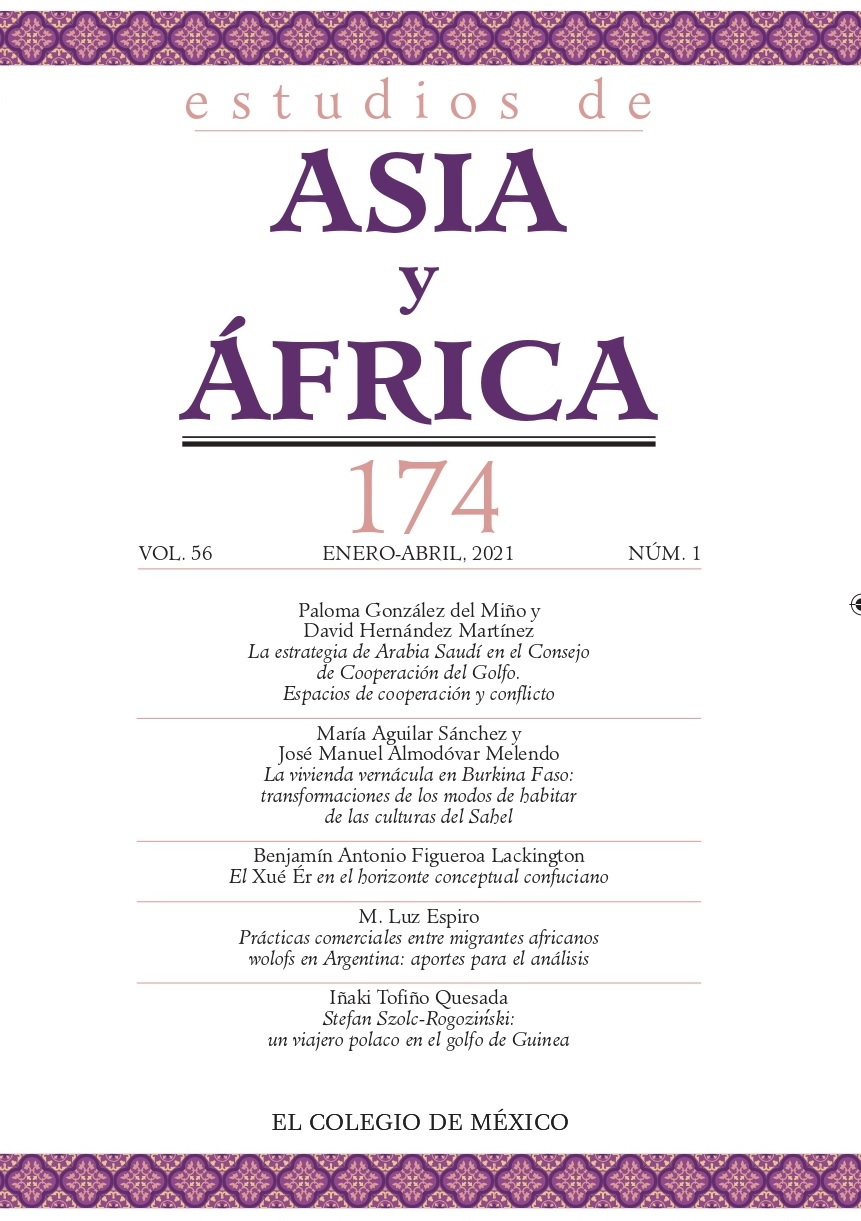Resumen
El presente artículo ofrece un comentario panorámico del Xué Ér 學而 con base en el más amplio entramado conceptual del Lúnyu 論語, célebre texto confuciano atribuido a Kongfūzı 孔夫子, “Confucio”. Se analizan seis nociones medulares que aparecen a lo largo de los 16 aforismos del Xué Ér: xué 學, jūnzı 君子, xiào 孝, běn 本, rén 仁 y lı 禮. Se señalan además diversas propuestas exegéticas contemporáneas referidas a sus posibles traducciones en lenguas indoeuropeas modernas.Referencias
Andreini, Attilio. 2008. “Breve riflessione sul dire e sul fare nel pensiero cinese classico”. En Cina: West of California?, editado por Mario Nordio, 27-43. Venecia: Marsilio.
Cheng, Anne. 2000. Storia del pensiero cinese. Vol. 1: Dalle origini allo «Studio del mistero». Traducido por Amina Crisma. Turín: Einaudi. Confucio. 1997. Lun Yu: Reflexiones y enseñanzas. Traducido por Anne-Hélèn Suárez. Barcelona: Kairós.
Confucio. 1998a. The Original Analects: Sayings of Confucius and His Successors. Traducido y comentado por E. Bruce Brooks y A. Taeko Brooks. Nueva York: Columbia University Press.
Confucio. 1998b. Analectas. Traducido por Alfonso Colodrón. Madrid: EDAF.
Confucio. 2003. Confucius Analects: With Selections from Traditional Commentaries. Traducido por Edward Slingerland. Indianapolis: Hackett.
Confucio. 2006. Dialoghi. Traducido por Tiziana Lippiello. Turín: Einaudi.
Confucio. 2007. The Analects of Confucius. Traducido por Burton Watson. Nueva York: Columbia University Press.
Confucio 孔夫子. 2011. Lúnyu 論語 [Diálogos/Analectas]. Traducido por James Legge. En Chinese Text Project, librería digital editada por Donald Sturgeon. https://ctext.org/analects/xue-er
Confucio (Kung-Fu-Tsé) y Mencio (Meng-Tsé). 1969. Los libros canónicos chinos. La religión y la filosofía más antiguas y la moral y la política más perfectas de la humanidad. Traducido por Juan B. Bergua. Madrid: Clásicos Bergua.
Crisma, Amina. 2004. Conflitto e armonia nel pensiero cinese dell’età classica: il Trattato sui riti di Xunzi. Padua: UNIPRESS.
De Landa, Manuel. 2011. Mil años de historia no lineal. Traducido por Carlos de Landa Acosta. Barcelona: Gedisa.
Graham, Angus Charles. 2012. El Dao en disputa: la argumentación filosófica en la China antigua. Traducido por Daniel Stern. México: Fondo de Cultura Económica.
Jullien, François. 2001. Un sabio no tiene ideas: o el otro de la filosofía. Traducido por Anne-Hélène Suárez. Madrid: Siruela.
Jullien, François. 2010. De lo universal, de lo uniforme, de lo común y del diálogo entre las culturas. Traducido por Tomás Fernández Aúz y Beatriz Eguibar. Madrid: Siruela.
Jullien, François. 2016. Essere o vivere: Il pensiero occidentale e il pensiero cinese in venti contrasti. Traducido por Emanuela Magno. Milán: Feltrinelli.
Kroll, Paul W. 2017. A Student’s Dictionary of Classical and Medieval Chinese. Leiden: Brill.
McLeod, Alexus. 2012. “Ren as a Communal Property in the Analects”. Philosophy East and West 62, núm. 4 (octubre): 505-528. https://doi.org/10.1353/pew.2012.0055
Meynard SJ, Thierry. 2015. The Jesuit Reading of Confucius: The First Complete Translation of the Lunyu (1687) Published in the West. Leiden: Brill.
Mòzi 墨子. 2011. Jiān’ài Xià 兼愛下 [Amor universal III]. Traducido por W. P. May. En Chinese Text Project, librería digital editada por Donald Sturgeon. https://ctext.org/mozi/universal-love-iii
Ni, Peimin. 2008. “Do Not Take Confucians as Kantians: Comments on Liu Qingping’s Interpretation of Confucian Teachings”. Dao: A Journal of Comparative Philosophy 7, núm. 1 (marzo): 45-49. https://doi.org/10.1007/s11712-008-9040-6
Ni, Peimin. 2009. “How far is Confucius an Aristotelian?: Comments on May Sim’s Remastering Morals with Aristotle and Confucius”. Dao: A Journal of Comparative Philosophy 8, núm. 3 (septiembre): 311-319. https://doi.org/10.1007/s11712-009-9130-0
Puett, Michael. 2006. “Innovation as Ritualization: The Fractured Cosmology of Early China”. Cardozo Law Review 28, núm. 1 (otoño): 23-36.
Puett, Michael. 2010. “Theodicies of Discontinuity: Domesticating Energies and Dispositions in Early China”. Journal of Chinese Philosophy 37, núm. 1 (diciembre): 51-66. https://doi.org/10.1111/j.1540-6253.2010.01619.x
Puett, Michael. 2015. “Ritual and Ritual Obligations: Perspectives on Normativity from Classical China”. The Journal of Value Inquiry 49, núm. 4 (diciembre): 543-550. https://doi.org/10.1007/ s10790-015-9524-7
Pulleyblank, Edwin G. 1995. Outline of Classical Chinese Grammar. Vancouver: University of British Columbia Press.
Rosemont Jr., Henry. 2013. A Reader’s Companion to the Confucian Analects. Nueva York: Palgrave Macmillan. https://doi.org/10.1057/9781137303394
Rosenlee, Li-Hsiang Lisa. 2006. Confucianism and Women: A Philosophical Interpretation. Albany: State University of New York Press.
Rosenlee, Li-Hsiang Lisa. 2014. “Why Care? A Feminist Re-appropriation of Confucian Xiao 孝”. En Dao Companion to the Analects, editado por Amy Olberding, 311-334. Dordrecht: Springer. https://doi.org/10.1007/978-94-007-7113-0_15
Wáng Yángmíng. 王陽明. 1996. Wang Yang Ming Quan Ji 王陽明 全集 [Obras completas de Wáng Yángmíng]. Vol. 1. Beijing: Hong qi chu ban she.
Yu, Zeng. 2013. “Análisis de la interpretación de ‘Ren’ en la traducción de ‘Lunyu’ (Analectas del Confucio)”. Estudios de Traducción 3, 203-211. https://doi.org/10.5209/rev_ESTR.2013. v3.41999
Esta obra está bajo una licencia internacional Creative Commons Atribución-NoComercial-SinDerivadas 4.0.
Derechos de autor 2022 Estudios de Asia y África


